Yard list up to 10
This week we’ve had male & female (8) Northern Cardinals, (9) Red-winged Blackbirds, and (10) Song Sparrows at our feeders. Now we’re talking!
This week we’ve had male & female (8) Northern Cardinals, (9) Red-winged Blackbirds, and (10) Song Sparrows at our feeders. Now we’re talking!
This morning we walked the Lakeside Trail at Independence Grove Forest Preserve. The sun was shining, the wind was blowing, and the birds were active.
A lone Killdeer was calling at the water’s edge.
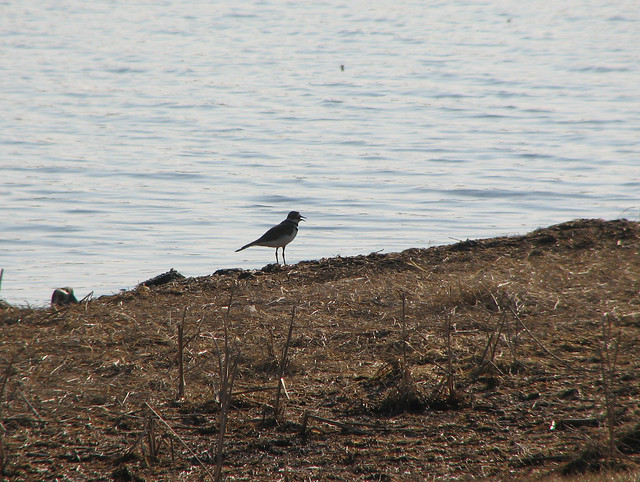
A Ring-billed Gull snacked on a crab along the path.
We saw our first Brown-headed Cowbirds of the season.
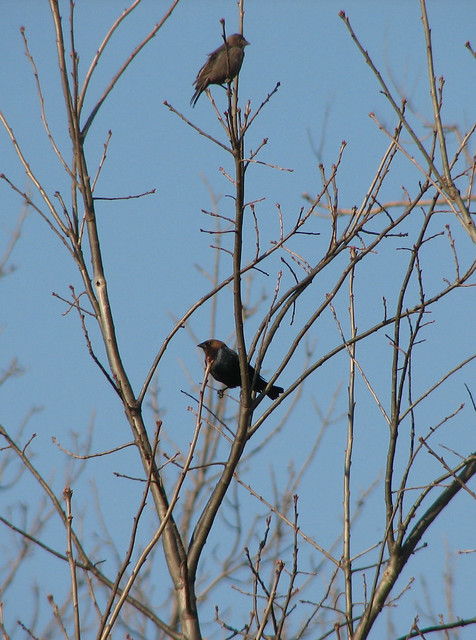
Red-winged Blackbirds were everywhere, showing off for the ladies and staking out territory.
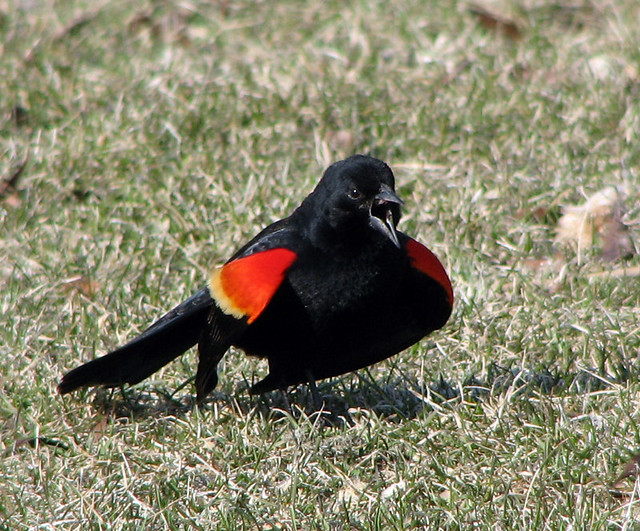
The lake was full of waterfowl. You can see American Coots, Redheads, and Common Goldeneye in this photo.
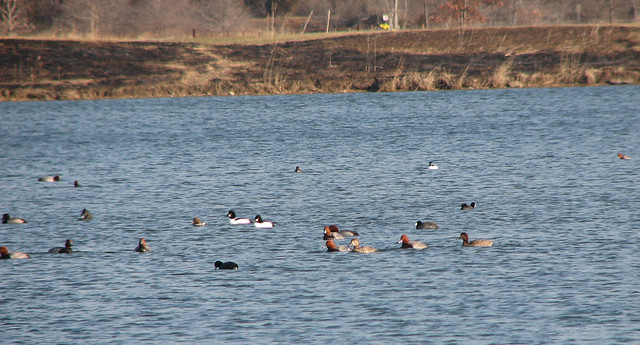
We even saw a Red-winged Blackbird dive-bombing a Red-tailed Hawk.

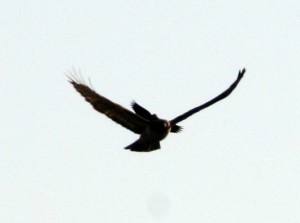
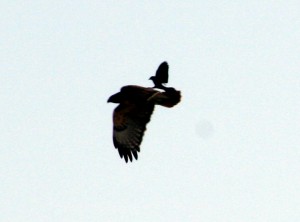
The last time we went to Independence Grove was on New Year’s Day and it was well below freezing. We barely lasted 10 minutes outside before we ran back to the comfort of the car. Today’s weather was muuuuuch better!
The long lasting freeze that hit the Netherlands this winter was fatal for about half of country’s native Common Kingfishers. Dutch bird research group SOVON conducted the survey on the little birds that rely on unfrozen waters for survival.
The Dutch name for Kingfisher, IJsvogel, means “Ice Bird” – although these small fishing birds have no love for ice.

The worst losses took place in the provinces of Limburg, Noord-Brabant and Gelderland, which suffered some of the coldest temperatures and longest freezes. In Gelderland, 39 Kingfishers were counted as late as December, but in January only 3 remained and in February only one was counted.
After such a large population decline, it will take several years for Dutch Kingfishers to rebound. After eleven years of relatively warm winters, more and more Kingfishers were remaining in the country rather than migrating south. The population of nesting Kingfishers in Holland also increased during these mild years.
The exact toll on the Dutch Kingfishers won’t be known until the fall. After the breeding season the birds will be more visible and surveys will be possible to tally their numbers.
Following the recent recall of a type of Wild Birds Unlimited bird food due to possible salmonella contamination, there has been some talk on the Wisconsin Birding Network regarding feeder sanitation in general. Here are some of the tips that were posted.
It’s important to remember that for the sake of your birds, feeders should be cleaned on a regular basis.
Imagine that the corn-on-a-wire is attached to a helicopter. The lengths squirrels will go to…

I’m pretty sure these corn cobs were meant as squirrel food, but the caption makes this photo cute. Squirrel antics are fun to watch, though I’ve never really seen any go too far to get food. That’s okay – there are plenty of antics to see on YouTube. I like the sound effects on this one:
Last night we saw a scuffle between four Canada Geese on top of the warehouse behind our house. Two of the geese were acting aggressive towards the other two, who eventually flew off. I managed to get a video of the incident.
The remaining birds stayed there for about 20 minutes before flying off. One of them appeared to lay down while the other stood erect and looked around the whole time. We wondered if they could be staking out a possible nesting spot. The roof is at a slight angle, so I don’t think it would be a good spot for them to nest, even though Canada Geese have been known to nest on rooftops (caution: that last one links to a cam. You have been warned).
Here’s where the birds hang out before descending on our feeders.
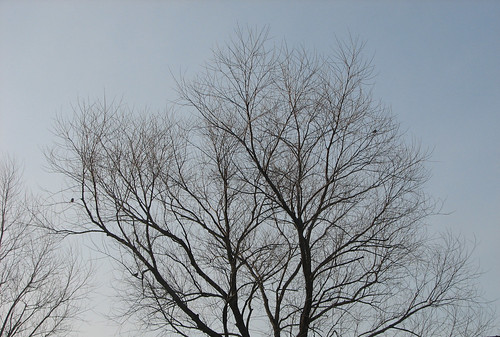
What, you can’t see the birds? There are three House Finches. Here, let me help you:
They joined a few of their “friends” down at the feeders, but there was a lot of aggravation. Bullying ensued:
For more images of the sky, from all over the world, visit Skywatch Friday.
Via Twitter (I’m @Birdorable) the other day I saw that Cooper’s Design has a campaign to raise money for Ducks Unlimited. I made a donation in their name and scored a great Cooper’s Design t-shirt, which arrived in the mail yesterday!
The shirt came in this very cool I Give Ducks Bread tote bag. I think this logo is so cute – the duck has $$ in his bill!
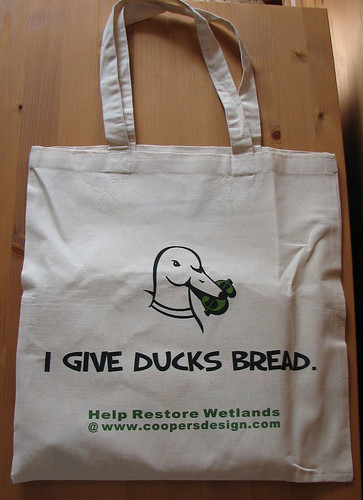
This is the front of the shirt:
And the large design on the back:
Ducks Unlimited is dedicated to preserving wetlands and waterfowl habitat.
Ducks Unlimited conserves, restores and manages wetlands and associated habitats for North America’s waterfowl. These habitats also benefit other wildlife and people.
If you’d like to make a donation, feed some bread ($$) to the ducks and help preserve wetlands, why not make a donation to Ducks Unlimited?
We’ve been getting Juncos and House Finches to our feeders every day. A pair of Chickadees comes by every couple of days (that we’ve seen) and so does our squirrel. That’s right, we get one squirrel here every couple of days. When’s the last time you had just one squirrel coming around?!
Anyway, this morning we actually counted three pairs of House Finches. I love the bright males. Plus these guys seem to be the only ones that understand the feeders. Unfortunately I didn’t get the camera in time to catch all of them, but it would have been a lousy photo anyway – we really need to clean the windows. Later on, we had our sixth back yard bird species visit – the omnipresent House Sparrow. Another species I won’t have to miss from Europe (like the Starling – love ’em! 
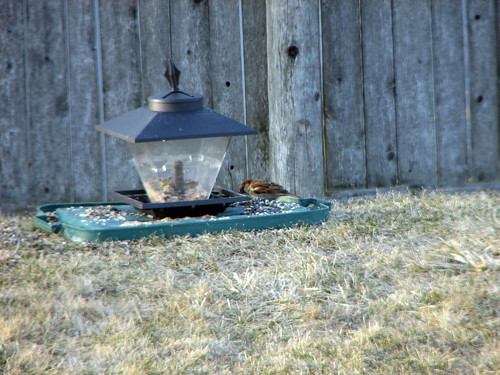
To make up for those, here are some great shots of House Sparrows I found on Flickr:
This reminds me that this blog got started because of a House Sparrow. Arthur and I had just started our own personal blog and I was writing a lot about the House Sparrow who was killed for dominoes. I was finding other interesting bird stories in the news so we decided I should have my own bird blog, and so MagnificentFrigatebird.com was born.
Last thing: our neighbors seem to have a problem keeping their dogs in their yard. Twice this week we’ve had a big scary brown monster in our yard (that’s our cat’s opinion, anyway). So in addition to the birds and the squirrel, we need to add Chow Chow to our yard list.
Vogelbescherming, the Dutch partner of BirdLife International, celebrates its 110th anniversary on Friday. To celebrate, the Dutch postal service (TNT) will issue a commemorative stamp to honor Vogelbescherming. The stamp, to be issued in May, joins stamps honoring other Dutch charity anniversaries like SOS-Kinderdorpen (60 years), Cordaid (95 years), De Zonnebloem (60 years), and KWF Kankerbestrijding (also 60 years – busy Dutch people in 1949).
I couldn’t find images of the upcoming stamps, but via their website I see there have been Vogelbescherming stamps issued in the past.
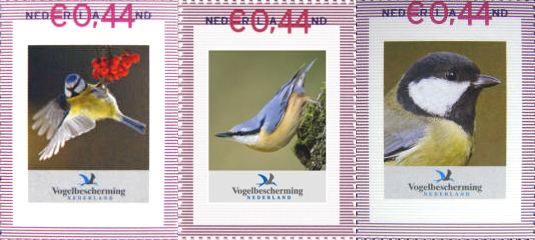
This page also has a nice collection of Dutch stamps featuring birds throughout the years (with some Austrian and Belgian stamps, too). Do you or does someone you know collect bird stamps?